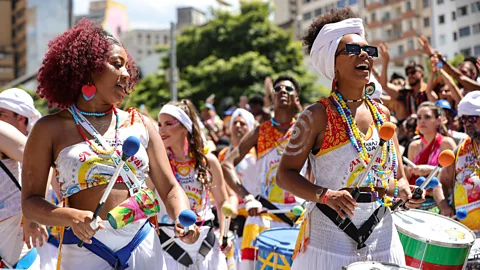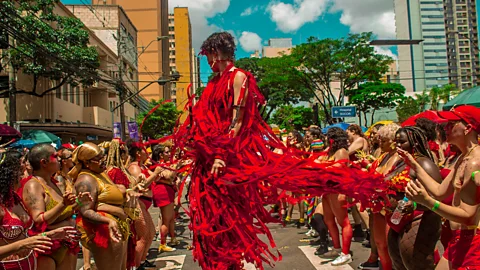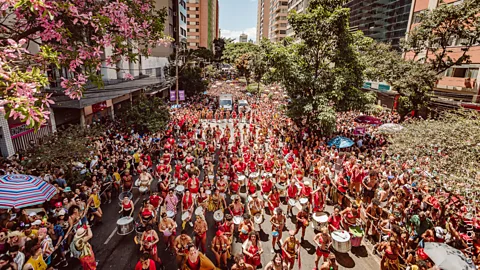Brazil's new it-town for Carnival 2024
 Sipa US/Alamy
Sipa US/AlamyThis year, Brazilians seem to have recognised that the heart of carnival culture is not in Rio, but in little-known Belo Horizonte.
The city of Belo Horizonte is little known outside Brazil. Despite being a state capital and Brazil's sixth-largest city, Beagá, as locals affectionately call it, doesn't have beautiful beaches or colonial architecture to help put it on the map. Until recently, the city didn't even participate in Brazil's much-anticipated carnival season.
However, Belo Horizonte's young Carnival has quickly become one of Brazil's most popular. This year's Carnival (officially from 27 Jan-18 Feb, with the festivities peaking from 9-14 Feb) will see a record number of 5.5 million people celebrating in the city's streets – a figure considerably larger than its resident population. Headline acts, including international superstar Anitta, are also making an appearance for the first time, confirming Beagá as Brazil's hot new Carnival destination.
It would be difficult to overemphasise how important Carnival is in Brazil. The period of merrymaking leading up to Lent is celebrated in other countries, but nowhere else is it pursued with such enthusiasm as in Brazil. Carnival is also big business: in 2023 it contributed more than R$8,180m (about £1.3bn) to the Brazilian economy.
 Amanda Andrade/Truck do Desejo
Amanda Andrade/Truck do DesejoRio de Janeiro has traditionally captured almost half of this business and attracted most of the international tourists; its Carnival is the world's largest and most extravagant. Coastal cities like Salvador and Recife also have a strong Carnival tradition, while more recently, Brazil's largest metropolis, São Paulo, has emerged as an important Carnival destination.
But this year, Brazilians-in-the-know are heading to Belo Horizonte.
Built as a planned city 127 years ago, Belo Horizonte is the capital of Minas Gerais, a state famous for its culinary traditions and sugarcane spirits. The city itself is renowned for its bohemian culture and laid-back vibe, but Carnival is taken very seriously here – blocos, or street bands, start as early as 05:00, and continue on until the early evening. This year, the number of blocos held will surpass that of Rio, and its Carnival is expected to inject R$1bn (£160m) into the local economy.
"It is only in even more recent years that Beagá has emerged as a popular destination for Carnival goers," recalled Marina Pisa, organiser of the popular Pisa na Fulô bloco in Belo Horizonte. "People used to leave the city – it was deserted."
According to Pisa, Belo Horizonte did used to celebrate Carnival when the city was founded in the late 19th Century. But in the 1980s, the parades died out due to lack of funds and interest, and it was only in 2009 that Carnival here was "reborn".
 Ângulos Foto/Truck do Desejo
Ângulos Foto/Truck do DesejoNatalia Becattini, a musician in one of the city's blocos, says that this rebirth was a decidedly political moment. "It was a political process, a left-wing rebellion," she noted.
Fernanda Branco Polse is a member of Truck do Desejo, a bloco in Belo Horizonte that was created for members of the lesbian, bisexual and trans communities. According to Polse, carnival in Belo Horizonte began as part of a protest movement against the former mayor. When the mayor banned the use of a major city square as a festive space, protestors occupied the area wearing bikinis and carrying their loudspeakers. "It's been a Carnival of fight and resistance ever since," said Polse.
Ironically, the city government has now started getting involved in the Carnival – something not all the blocos are comfortable with. "It's as if they're trying to appropriate a spontaneous and popular event to somehow standardise our carnival," said Polse. Besides investing for the first time in carnival infrastructure, the state of Minas Gerais has also spent more than R$6m on advertising across Brazil with the slogan, "Feel at home on the streets in Belo Horizonte." In a move likely calculated to enrage Rio residents and ensure the ad went viral, the poster was even plastered over billboards in the Rio metro.
But the newfound popularity of Belo Horizonte's Carnival among hipster Brazilians is not just the result of savvy advertising. Gustavo Jreige is the host of Festa VHS, a popular LGBTQ+ party in São Paulo. Although he usually spends Carnival in São Paulo, this year, he is heading to Beagá. Jreige says that Belo Horizonte occupies a sweet spot: it is well-organised, but not overly curated; and it is big, but not yet too well-established.
 Ângulos Foto/Truck do Desejo
Ângulos Foto/Truck do Desejo"To throw a bloco in São Paulo, you have to follow a lot of rules," said Jreige. "It's well-organised, but very strict." In contrast, he said, events outside of the Sambadrome parades in Rio can feel overly chaotic.
The heart of Brazilian nightlife
The boteco is an establishment at the heart of Brazilian nightlife. At these bars, plastic chairs and tables are common, and it is obligatory to serve bar snacks like coxinhas – large, tear-shaped croquettes – alongside large bottles of ice-cold beer. In Belo Horizonte, the capital of an agricultural state known for good food and drink, botecos are not only abundant, they're also highly rated.
Belo Horizonte's boteco culture is represented at Carnival by the various drinks created in the city and associated with the blocos. The most famous of these is Xeque Mate – a combination of rum, mate, guarana and lime – that has already become famous across Brazil.
Most of the blocos that take place in Rio are organised spontaneously and are liable to be shut down by police. "When I was there in 2019, I spent more time trying to find blocos than actually enjoying them," Jreige said. In Belo Horizonte, blocos run according to a timetable, but they are not as constrained as they would be in São Paulo.
While Jreige said that Carnival in São Paulo has expanded to the point where it has "lost its essence", Carnival in Belo Horizonte has not been around long enough to become overly entrenched or commercialised. According to Pisa, "Until recently, nobody would come here, so it still feels very fresh."
Two other important factors in Belo Horizonte's popularity are cost and safety. In comparison to well-established Carnivals in Rio and Salvador, getting to and staying in Belo Horizonte is still relatively affordable. And despite being a city of some three million people, Belo Horizonte maintains a small-town vibe. "It's a young city with a history of migration from the countryside, and this is reflected in people's friendly, welcoming attitudes," said Becattini. In addition, it has a reputation for being one of Brazil's safer major cities. "We have safety issues, but it's not the same as Rio or São Paulo – we're smaller and safer, and that makes the blocos more comfortable," she added.
 Lucas Lobato/Truck do Desejo
Lucas Lobato/Truck do DesejoIts growing cultural significance is also a draw. Jreige, who has started throwing his VHS party in Belo Horizonte, said, "People have got used to the idea of visiting Belo Horizonte because of the many festivals and cultural events it hosted this year – it's also the home to many new, exciting brands."
"People are nice in Belo Horizonte anyway," he added, "[and] during Carnival, when everyone is happy, it's going to be even better."
---
Join more than three million BBC Travel fans by liking us on Facebook, or follow us on Twitter and Instagram.
If you liked this story, sign up for The Essential List newsletter – a handpicked selection of features, videos and can't-miss news delivered to your inbox every Friday.
